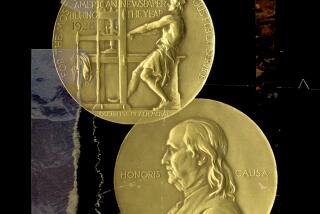Robert Penn Warren Is Poet Laureate
- Share via
WASHINGTON — Robert Penn Warren, named Wednesday as America’s first poet laureate, said Thursday that he took the post to foster poetry and poets but not to produce verse on demand for official occasions.
“I don’t write that way,” the 80-year-old three-time winner of Pulitzer Prizes for literature said in a telephone interview from his Connecticut home. “I have written poetry all my life but I couldn’t sit down and write about a given subject. I just couldn’t do it.”
In British tradition of nearly 300 years, poets laureate have served as court chroniclers of royal births, deaths, weddings and coronations with results varying from ludicrous to distinguished.
But Eleanor Clark Warren, wife of the poet, was even more emphatic in expressing her distaste for the British institution. “That’s merely glorification of the monarchy and this is a democracy,” she said in discussing the post to which her husband was appointed by the librarian of Congress, Daniel J. Boorstin.
Tells Expectations
Warren told an interviewer shortly after his appointment that he does not expect the creation of the office, the result of a bill introduced by Sen. Spark M. Matsunaga (D-Hawaii), to touch off a national boom in poetry. “Poetry is not something that can be made by any official,” he said.
Asked if he intends to use his new connection with the national government to attempt to stimulate the teaching of poetry in public education, the new laureate quickly replied: “I love teaching but I’m not doing that anymore. I’ll just do the job at hand.”
The job at hand, he said, is to consult with the Library of Congress on its poetry collection, a task he has performed twice in the past as an official consultant; to give a reading at the library in October and to give a lecture and possibly write an essay on the state of poetry sometime during his one-year tenure. Those are the terms as laid down by Boorstin for the post, which pays $36,000, somewhat better than the British poet laureate’s traditional stipend--a few coins and a barrel of wine.
Praise From Associates
Longtime associates were united in praise for Warren, who attended Vanderbilt University and whose first work was published in 1923. Cleanth Brooks, co-author of a textbook, “Understanding Poetry,” that is still used in schools, called the appointment “entirely appropriate” and said he agrees with Warren’s interpretation of the role of a poet laureate in the United States.
“That’s not to say that good verse can’t be written for a commission,” Brooks said by telephone from his home in New Haven, not far from Warren’s Fairfield home. “But the muse is a wayward girl.”
Another friend from the 1920s, Andrew Lytle of Monteagle, Tenn., retired editor of the “Sewanee Review,” was equally enthusiastic. Warren has been a steady contributor to the review since 1944.
“He’s the best man,” Lytle, 81, said in a telephone interview. “He’s a modest man, he has a good heart and he’s a hard worker. It takes discipline to be an artist.”
Also pleased with Warren’s selection was Sen. Matsunaga. “It was a matter of recognizing the great poets of our country in order to inspire young people,” he said.
The Hawaiian Democrat said he introduced the bill to name a poet laureate when he first entered the House in 1963. Matsunaga said he wrote poems himself during World War II as a soldier in the 442nd Regimental Combat Team.
More to Read
Sign up for our Book Club newsletter
Get the latest news, events and more from the Los Angeles Times Book Club, and help us get L.A. reading and talking.
You may occasionally receive promotional content from the Los Angeles Times.








